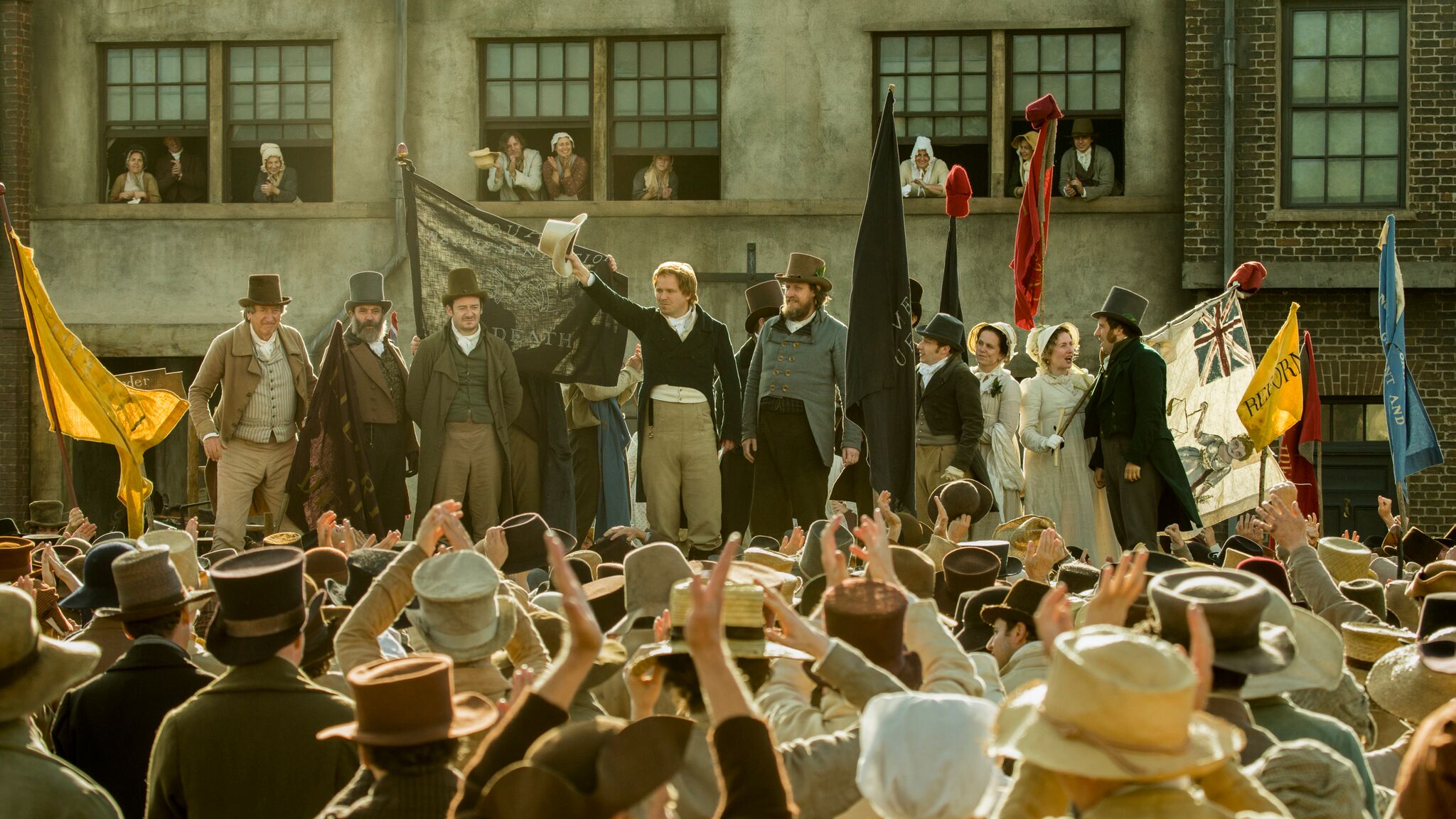A biting sense of topicality pervades this passionate account of the murder of protesters at a mass pro-democracy protest in Manchester in 1819
Mike Leigh brings an overwhelming simplicity and severity to this historical epic, which begins with rhetoric and ends in violence. There is force, grit and, above all, a sense of purpose; a sense that the story he has to tell is important and real, and that it needs to be heard right now. The film has an uncompromising seriousness, as much like George Eliot’s novel Felix Holt as Shelley’s The Masque of Anarchy, the poem inspired by Peterloo.
On 16 August 1819, at what we would now call a pro-democracy demonstration in St Peter’s Field, Manchester, an excitable band of cavalry and yeomanry – whose commander had airily absented himself for a day at the races – charged with sabres drawn into a crowd of 100,000 unarmed people, many of whom were unable to escape the enclosed space. The troops killed 18 and injured hundreds more.
It was Britain’s 19th-century mix of Sharpeville and Hillsborough. The government was entirely delighted with the result, and not displeased with the nickname “Peterloo”, as it felt like a rerun of its victory over Napoleon, the creature of something it continued to fear intensely: the French Revolution.
Peterloo was eventually the seed of reform, and rooting out the political mendacity and bad faith that underpinned the massacre inspired a new wave of national journalism, giving rise to this paper’s ancestor, the Manchester Guardian. Leigh has complained that Peterloo is not sufficiently taught in schools and he could be right. There’s not much place for it among the Tudors’n’Nazis. I would say there is something about Peterloo not much understood even where it is taught. The protesters were complaining about taxation without representation: it wasn’t just the French Revolution the Hussars were trying to crush in St Peter’s Field, but the American Revolution, which had shown that defeating the British government was possible. And these were people, in any case, maddened with hunger, because corn law tariffs had barred imports of cheap grain from the continent. In 2018, our government is planning to stockpile food (and medicines) in the event of similar restrictions on trade.
Leigh creates a huge, crowded canvas, dourly dark in the opening scenes, and then vividly colourful for the spectacular and brutal climactic crowd sequences. No single story or character predominates, not even the conceited orator and agitator Henry Hunt, coolly played by Rory Kinnear, who has come from London to Manchester, with some condescension, to be the star turn at the fateful St Peter’s Field meeting. “Bring me a light repast!” he says on arrival to the gawping maidservant, who whispers: “What’s that?”
Hunt is, in his way, the dramatic mediator between the government and the governed, the tyrants and the tyrannised. He is the reformer, the radical, but also the wealthy liberal and man of means. Maxine Peake plays Nellie, the tough Manchester worker who is the mother to Joseph (David Moorst) a young soldier shown stumbling around dazed at Waterloo in the opening scene. Stricken with PTSD, he finally gets home to his family and is to find a terrible parallel destiny at Peterloo.
Karl Johnson plays the cantankerous and arrogant home secretary, Lord Sidmouth, who presides over a paranoia-inducing network of spies and provocateurs; Robert Wilfort is the insidiously bland prime minister, Lord Liverpool, and Tim McInnerny brings a grisly black comedy to the role of the pampered, bloated Prince Regent. A potato thrown at his carriage is spun by Sidmouth as an assassination attempt to justify suspending habeas corpus and dispensing with civil liberties.
There are big, sumptuous, theatrical moments in Peterloo: particularly the Commons and Lords debates. But this is generally an austere, even dour film. It is about talk: talk, talk, and more talk in stark rooms and cheerless parlours. Political agitation was about talk; oratory was the fuel that ran the campaign, or the oxygen that would make the flame catch. But without this talk, the explosive action would not make dramatic or emotional sense. Leigh lets rip with the great and terrible scene of Peterloo: with all its terror, panic and strange, nauseous excitement. Peterloo is like something between Ken Loach’s Land and Freedom and Ava DuVernay’s Selma. A director such as Paul Greengrass might have made the massacre of Peterloo more violent, more kinetic, more disorienting. Leigh and his cinematographer Dick Pope keep a clearer, calmer view but it is no less impressive or immersive. David Lean might have been proud to have shot the sequence.
In scenes outside Manchester, Leigh finds an unexpected, even pastoral sadness and beauty. The protesters gather on Saddleworth Moor to practise their drilling and marching – important for the maintenance of good order. There is something strangely moving about these men and women, whose lives had been utterly transformed and urbanised by new technology, assembling in a field and resembling the workers of centuries before. Two women quietly listen to the eerie, sad music of three fiddlers. With this richly intelligent, passionate movie Mike Leigh has fought a brilliant rearguard action on history’s political battlefield.

